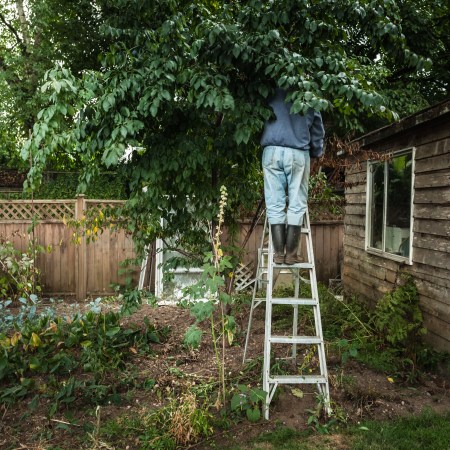SurvivorNet is one of the internet’s leading resources for information on cancer. They work with a network of the world’s foremost oncologists, surgeons and clinics to create video content on risk factors, awareness, screening and more. Not everyone can fly around the country getting second and third opinions — so they bring the expertise to you.
Men are different. We live differently, our bodies age and develop differently, and we need to take care of ourselves differently.
To reduce your chance of getting cancer, there are plenty of precautions that you can — and should — take, 10 of which we’ve compiled below with the help of some leading industry experts.
They’re by no means foolproof (nothing is), but we can assure you they’ll help.
1) Get a colonoscopy
“Colorectal cancer in America is the third most common cancer, and up until recently, it was the second most common cause of death,” says Dr. Zuri Murrell, Director of the Colorectal Cancer program at the Samuel Oschin Comprehensive Cancer Institute at Cedars-Sinai Medical Center. “A colonoscopy should be done at age 50 if you have no family history and no other risk factors. If you have a family history of colon cancer and/or a first- or second-degree relative had colon cancer before the age of 50, you should get tested 10 years earlier than that relative [did].” Race can also be a factor in how early you should start preventative testing. According to Murrell, “a colonoscopy should be done in African Americans starting at age 45.”
2) Get a PSA Test
“If you are between 55 and 70, get a PSA Test!” says Dr. James Brooks, urologic oncologist at Stanford Hospital & Clinics and an Associate Professor in the School of Medicine. “If a man has an elevated PSA, he has somewhere around a 20-40 percent chance of having prostate cancer. The latest data shows that the death rates from prostate cancer are down 53 percent compared to their peak. The thing that changed the most in that timeframe? Screening for prostate cancer using PSA blood testing.”
3) Cut down on simple sugars
Cut out “the cookies, the cakes, the candies” says Dr. Steve Freedland, urologist at Cedars-Sinai Medical Center.
4) Eat naturally fed meats that aren’t overcooked
“If you eat steak, make sure you are eating animals that are eating their natural diet — grass-fed steaks, free-range chicken, wild-caught fish,” says Dr. Freedland. “The way we process meat, cook it and create those charred lines can actually cause cancer as well. So you wanna get back to the whole foods concept.”
5) Use sunscreen to reduce your risk for melanoma by 50%
“When it comes to skin cancers such as squamous cell, basal cell and melanoma, even some rare cancers like Merkel cell carcinoma, protecting ourselves from the sun can reduce that risk. I tell my melanoma patients that that’s one thing they can really take control over when they go home,” says Dr. Cecilia Larocca, dermatologist in the Center of Melanoma and Cutaneous Oncology at Dana-Farber Cancer Institute. “There was a great study that came out of Australia that if patients used sunscreen consistently over a period of 10 years, they were actually able to reduce their risk for melanoma by 50 percent.”
6) If you smoke, stop
We know smoking causes lung cancer, and that quitting can help the success of your lung cancer surgery. But smoking can have an impact on prostate cancer as well, according to Dr. Freedberg.
7) Lose weight
Obese men are about 35% more likely to die from prostate cancer. “Obesity correlates with prostate cancer risk. We know this because biologically, the fat that’s built up in the body, the insulin that builds up in response to all of the excess sugar intake, they’re all stimulants for prostate cancer growth and aggression,” says Dr. Edwin Posadas, Director of Translational Oncology and Medical Director of the urologic oncology program at Cedar Sinai Medical Center.
8) Get screened for prostate cancer if you are over 70
Two-thirds of men who live to the age of 70 will experience prostate cancer. As men get older, the likelihood only goes up. “In fact,” says Patrick Swift, Medical Director of the Stanford Cancer Center South Bay, “Researchers have found that as many as 75-80 percent of all 80-year-olds have small spots of cancer in their prostate.”
9) Drink in moderation
“If you want to have absolutely no risk from alcohol, then don’t drink at all,” says Dr. Elizabeth Comen, medical oncologist at Memorial Sloan Kettering Cancer Center. “Drinking alcohol carries with it certain risks. Having less than four glasses a week of alcohol is probably OK. I would feel comfortable with that. I think we’re learning every day about what the contribution of alcohol may be to cancer, and while we know that a lot isn’t good, I don’t necessarily tell patients, ‘You can’t EVER drink.’ But I do have some patients who say, ‘I am so terrified that every time I take a drink of alcohol, that I’m going to get breast cancer.’ Well, don’t drink alcohol.”
10) Seek out second opinions
Getting second opinions can seem like a hassle or like they just create confusion, but with as many available treatments as there are for prostate cancer, it’s important to get a second opinion. “I tell men who are diagnosed with prostate cancer that it would be far easier for them and far easier for me if there was only a single treatment option for prostate cancer. However, that’s just not the case,” says Dr. Jeffrey Sonn, Assistant Professor of Urology at the Stanford University School of Medicine. “Because prostate cancer, even the more aggressive types, doesn’t grow rapidly, there is time to safely seek out additional opinions to come to a decision that a man is comfortable with. Where he feels like he understands, ‘Why am I having this particular treatment? What are the pros, what are the cons? What appeals to me, what did my physicians recommend to me?’”
This article was featured in the InsideHook newsletter. Sign up now.





















